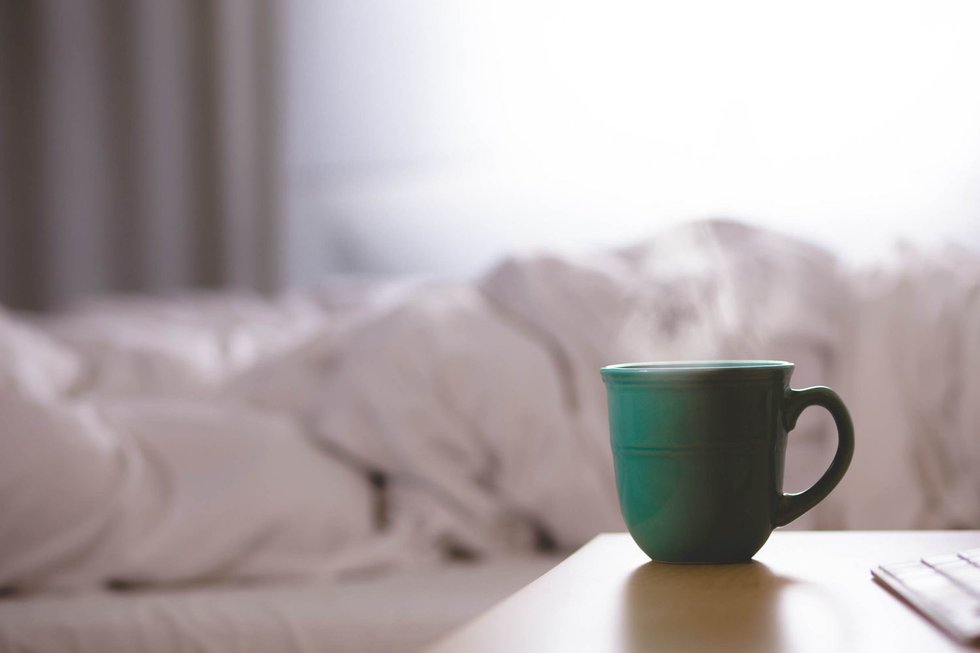Sweet dreams! 8 habits to ensure a good night's sleep
Mar 28, 2020
5 mins


Freelance Content Writer
Adults in the UK get an average of 6.4 hours of sleep per night, which is well below the 8 hours recommended by the NHS. Over half of the adults have had insomnia at some point in their lives, while over a third currently have it. Sleep quality has an enormous impact on how our days unfold, but since none of us can go back in time to improve past days, we should begin by making the most of our forty winks!
Welcome to the Jungle has advice on how you can sleep better, get into a bedtime routine that sticks, and ensure you get every day off to a good start.
The science behind bedtime routines
The benefits of sleeping well
A restful night’s sleep can lead to a feeling of satiety, help boost focus and energy levels for the following day, sharpen memory functions, and even improve mood and mental health. Conversely, poor sleep has a negative impact on hormonal balances in the body, which in turn affects both appetite and metabolism. To best prepare for a peaceful slumber, many experts suggest setting up a routine to wind down, including staying away from certain habits: no coffee for six hours before bedtime, no alcohol for three hours and no strenuous physical activity for around two hours before bed. In addition to these good habits, a dedicated routine for ending one day and preparing for the next will help you in sleeping like a log.
The benefits of sticking to a bedtime routine
While the term “bedtime routine” might make you think of sleep-averse toddlers, setting up a ritual for us adults can foster well-being and thwart the habit of procrastination, which can lower your self-esteem and image (find eight further tips on avoiding procrastination here.) Building a routine requires less energy and focus than other types of action you might take. You won’t need to draw upon your motivation reserves and burn through all your willpower, simply because habits help to simplify things. Mark Zuckerberg is well-known for dressing the same way every day, and he does this because it’s one less daily decision he needs to make.
In the sixties, Dr. Maxwell Maltz published a landmark book in the self-help and human potential genre, entitled “Psycho-Cybernetics”. Based on his own experiences in his plastic surgery clinic, Maltz observed that it took at least three weeks for his patients to get used to their new faces. In other words, that’s how long it takes for a new mental picture to replace an old one. While some people still adhere to this three-week rule, recent studies have shown it can take much longer to form new habits. In fact, the actual figure may be nearer to seventy days for a new habit to stick and become ‘automatic’. However long it takes you, though, one thing is for sure: once in place, a bedtime routine will help give your body and mind the right signals that it’s time to wind down.
Eight techniques to build into your bedtime routine
“We are what we repeatedly do. Excellence is not an act, but a habit.” - Aristotle
Your bedtime routine should include a range of techniques intended to have a relaxing effect on your mind and body.
1. Lower the temperature in your room
The temperature in your bedroom can seriously impact the quality of your sleep. While cold rooms might make it hard to fall asleep, hot or stuffy rooms make for restless sleepers. In fact, according to The Sleep Council, the ideal temperature for sleeping well is between 16-18°C. That means that your body must drop by around 1°C for you to reach the perfect sleep temperature. To help achieve this, air your room before sleeping in winter and invest in a decent fan or even air conditioner for the summer. Sleep trackers and intelligent alarm clocks, such as SleepCompanion and HugOne, integrate temperature readings into their sleep analysis.
2. Turn off your lights and limit your screen time
Avoid bright light and screens for at least an hour before going to bed.
85 percent of American adults told the Better Sleep Council that they have trouble sleeping at night. At least 95 percent of people use some kind of electronic device — TV, a computer, a phone, or a tablet — within an hour of bedtime, according to the National Sleep Foundation. Studies have also shown that the blue light from screens inhibits the production of melatonin, a hormone that is necessary for falling asleep. When the sun goes down, the light from screens sends the wrong signals to our brains and disrupts our biological clocks. While there are screen filters and even glasses aimed at preventing the potentially damaging effects of screen lights, as well as ‘night modes’ that soften the light devices emit, the best move of all is to always keep screens away from your bedtime routine.
3. Bathe before bedtime
Incorporating a shower or bath into your bedtime routine is another way to ensure your body’s temperature is well-adjusted to falling asleep. One study found that taking a bath or shower one to two hours before bedtime aids your natural circadian process and improves your sleep. To keep your routine environmentally friendly, consider making your bedtime bath or shower the only one of the day.
4. Keep a sleep diary
“Isn’t it nice to think that tomorrow is a new day with no mistakes in it yet?” - L.M. Montgomery, Canadian writer
Make a sleep diary and jot down a summary of your day, including significant events, thoughts, and feelings. Build it into your bedtime routine and use this opportunity to reflect and hit the restart button. Use each evening to finish the ‘chapter’ of that day, turn the page, and start another.Instead of lying awake with your mind racing, this practice will help your mind let go and positively focus on the next day. What’s more, getting into the habit of writing before bed will help you clarify, prioritize and accomplish your most important tasks.
5. Practice gratitude
“Gratitude is not only the greatest of virtues, but the parent of all the others.” - Cicero
Make a list of three positive thoughts per day. Say ‘thank you’ more often, and you will receive more gratitude and recognition in return. Do it with sincerity, no matter how small the accomplishment. Those who consistently express gratitude are more aware of the beneficial things that life has to offer, as well as being in a better position to identify those things. Simply put, when you express your gratitude, it is reflected throughout your work and social circles, and colleagues and team members will enjoy working with you more.
Moreover, this exercise will improve the way you see things in general and help you avoid falling into slumps, such as the dreaded “Sunday Blues”. To remember how much progress you’ve made, you only need to revisit earlier entries in your sleep diary.
6. Start off on the right foot
Set your alarm clock and then make a To Do List for the following day, writing down three things you want to accomplish. A successful morning, by which we mean one that is not facilitated solely by coffee, is linked to how you prepared for it the night before.
7. Be consistent
Stay on track by going to bed and getting up at the same times each day, regardless of whether it’s a weekday or the weekend. That way, you are sure to avoid the effects that are caused by disrupting your sleep cycle, which can be very similar to jet lag. For even greater efficiency, there are many connected devices and apps that will help you track your sleep, such as Sleep Cycle, Better Sleep, and Sleep Time.
8. Try out Yoga Nidra
As well as the demonstrated benefits of meditation at work, Yoga Nidra, which means “psychic sleep”, can help in achieving a deep sleep, which is also beneficial at work.
Translated by Andrea Schwam
Photo by David Mao @Unsplash
Follow Welcome to the Jungle on Facebook, LinkedIn, and Instagram, and subscribe to our newsletter to get our latest articles every day!

More inspiration: Physical health

Navigating your career while managing chronic illness
Struggling to juggle work and chronic illness? Learn how to create a supportive career path and find solutions.
Dec 24, 2024

The best equipment to help you get exercise without leaving your desk
A sedentary lifestyle can lead to serious health problems. So, how can you stay fit while still at your desk?
Nov 09, 2023

Glued to your desk all day? Try these discreet exercises
Laptop-based work can mean freedom and comfort, but a sedentary lifestyle also brings a host of health risks...
Oct 18, 2023

How the world of work is getting better for veterinarians
Though typically not considered a dangerous profession, veterinary services rank among the highest industries for non-fatal injuries
Oct 04, 2023

The dynamic benefits of walking meetings
As our jobs become more flexible, workers are finding new ways to improve their mental and physical health
Oct 03, 2023
The newsletter that does the job
Want to keep up with the latest articles? Twice a week you can receive stories, jobs, and tips in your inbox.

Looking for your next job?
Over 200,000 people have found a job with Welcome to the Jungle.
Explore jobs